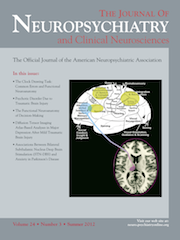Diffusion Tensor Imaging Atlas-Based Analyses in Major Depression After Mild Traumatic Brain Injury
Abstract
There are currently no known early neuroanatomical markers predictive of the development of major depression or depressive symptoms after mild traumatic brain injury (mTBI). The authors conducted a 1-year longitudinal pilot study to determine whether diffusion tensor imaging (DTI) measures collected within 1 month of mTBI could predict incident depression. Of the 14 subjects who met study inclusion criteria, 4 (28.6%) developed major depression over the follow-up period. Compared with the nondepressed group, those who developed depression had white-matter abnormalities in the fronto-temporal regions measured by DTI. These preliminary results highlight the need for additional studies, including studies using a larger sample and appropriate controls.



